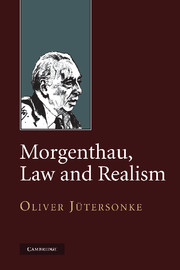Book contents
- Frontmatter
- Contents
- Preface
- Acknowledgements
- Note on the text
- 1 Hans J. Morgenthau in International Relations
- 2 The justiciability of disputes
- 3 Hans Kelsen and the reality of norms
- 4 Legal realism and behaviouralist social science
- 5 Legalism, romanticism and irresponsible statecraft
- 6 The legacy of legal formalism
- Name index
- Subject index
- References
4 - Legal realism and behaviouralist social science
Published online by Cambridge University Press: 17 November 2010
- Frontmatter
- Contents
- Preface
- Acknowledgements
- Note on the text
- 1 Hans J. Morgenthau in International Relations
- 2 The justiciability of disputes
- 3 Hans Kelsen and the reality of norms
- 4 Legal realism and behaviouralist social science
- 5 Legalism, romanticism and irresponsible statecraft
- 6 The legacy of legal formalism
- Name index
- Subject index
- References
Summary
‘Every intellectual in emigration’, Theodor Adorno (1903–69) wrote in Minima Moralia, ‘is, without exception, mutilated in some way, and does well to recognize this if he wishes to avoid being taught a cruel lesson behind the tightly-closed doors of his self-esteem’.1 Morgenthau certainly did recognize it and, perhaps better than most, was able to secure a niche for himself by identifying and taking up a twofold compromise position – between his fundamentally ‘Kelsenian’ convictions and US legal theory, and between the thought-styles of International Law and those of Political Science. How successful he was in doing so is reflected in the fact that we, the International Relations heirs of his ‘classical realism’, do not recognize it as a compromise at all. Yet a compromise it was, attained largely through bouts of improvisation and a few strokes of good fortune. The circumstances surrounding these events, and the way Morgenthau went about his academic transformation, is the subject of this chapter.
In order to join Morgenthau on his journey across the Atlantic, we need to set the scene by outlining the intellectual milieu that awaited him. Of course, just as in Chapter 2, no attempt will be made to provide a comprehensive account of the history of US legal theory.2 The following pages will thus merely flag a series of ‘events’ and turning points that are relevant to the task of situating Morgenthau in the US law scene.
- Type
- Chapter
- Information
- Morgenthau, Law and Realism , pp. 105 - 145Publisher: Cambridge University PressPrint publication year: 2010



